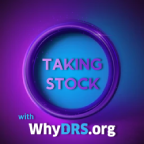This week on Taking Stock, Chives and Bibic take a trip back in time to the panic of 1907. A panic caused by wealthy people over leveraging themselves, leading to the public trying to take their money back from their respective banks. The same wealthy people that caused the panic decided they needed to protect themselves from future potential bank runs, this led to the creation of the Federal Reserve.
Taking Stock #13
Twitter Link:
https://twitter.com/i/spaces/1djGXNjgddexZ
mp3 Link:
https://static.wixstatic.com/mp3/06e09f_89158b1fc98448fc8d0fd64720b6803b.mp3
#Important Reminders
-
Listen to Taking Stock on demand (https://linktr.ee/takingstockpodcast)
-
Join DRSGME Discord (https://discord.gg/EGvmpdGDm)
-
Join Lemmy (https://lemmy.whynotdrs.org/)
-
Visit https://www.drsgme.org and https://www.whydrs.org
-
Terminate DirectStock (https://www.drsgme.org/terminating-from-directstock)
#Links and Resources
-
The Panic of 1907 and the Birth of The Federal Reserve https://www.whydrs.org/post/the-panic-of-1907-and-the-birth-of-the-federal-reserve
-
The Creature from Jekyll Island https://archive.org/details/TheCreatureFromJekyllIslandByG.EdwardGriffin
-
Computershared.net is back! https://www.computershared.net/ https://imgur.com/0ZM7C74
Just listened to this episode. Great topic of conversation. Interesting how one of the most powerful institutions in the world, the Fed, was born from a secretive plot, a “conspiracy” if you will.
It’s one of the reasons why I am a fan of strong cryptocurrencies, e.g. bitcoin & ethereum. There are many valid criticisms that can be made against cryptocurrencies, but if nothing else they represent an alternative system to the incumbent centralized fiat currency that is controlled by ultra wealthy members of society and represents their interests more than anyone else’s.
Something i think is very interesting, which was a little bit touched on in this episode, is how little most people know about what the fed is, how it came in to existence, the fact that it is not a government agency. Most people don’t really understand what it is or how it works or how it’s governed, which is probably something that benefits the Fed and US banking industry.
It’s one of the most powerful institutions in the USA and even the world, and yet is essentially completely detached from any sort of democratic process or oversight from the public.
I understand that the POTUS appoints the chairman, but I don’t think this is a very good reason to use to try and argue that therefore the will of the people is being appropriately represented in central bank.
There is a good book about this topic, All the Presidents’ Bankers by Nomi Prins that goes over the relationship between US presidents and their pals in the banking industry.
Throughout most of the 20th century, it didn’t really matter who the president was or which political party they belonged to, the banking industry and the ultra wealthy almost always comes out ahead. In basically every major war in the 20th century, the US banking industry was able to take advantage and make profits by providing financing. The influence of the US banking industry, of which the Fed is an appendage, cannot be separated from US foreign policy and therefore modern history as well as geopolitics.


